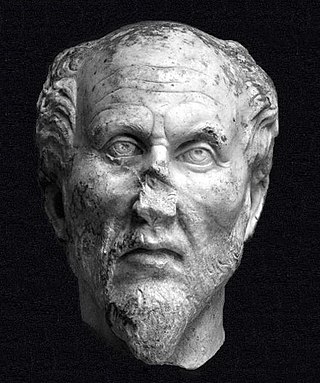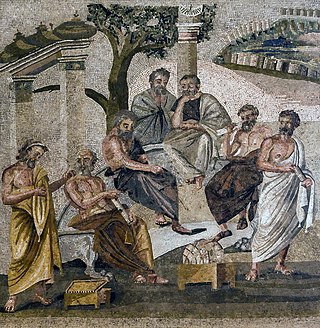Related Research Articles
Ammonius Saccas was a Hellenistic Platonist self-taught philosopher from Alexandria, generally regarded as the precursor of Neoplatonism or one of its founders. He is mainly known as the teacher of Plotinus, whom he taught from 232 to 243. He was undoubtedly the most significant influence on Plotinus in his development of Neoplatonism, although little is known about his own philosophical views. Later Christian writers stated that Ammonius was a Christian, but it is now generally assumed that there was a different Ammonius of Alexandria who wrote biblical texts.

Plotinus was a Greek Platonist philosopher, born and raised in Roman Egypt. Plotinus is regarded by modern scholarship as the founder of Neoplatonism. His teacher was the self-taught philosopher Ammonius Saccas, who belonged to the Platonic tradition. Historians of the 19th century invented the term "neoplatonism" and applied it to refer to Plotinus and his philosophy, which was vastly influential during late antiquity, the Middle Ages, and the Renaissance. Much of the biographical information about Plotinus comes from Porphyry's preface to his edition of Plotinus' most notable literary work, The Enneads. In his metaphysical writings, Plotinus described three fundamental principles: the One, the Intellect, and the Soul. His works have inspired centuries of pagan, Jewish, Christian, Gnostic, and early Islamic metaphysicians and mystics, including developing precepts that influence mainstream theological concepts within religions, such as his work on duality of the One in two metaphysical states.
Bernard of Chartres was a twelfth-century French Neo-Platonist philosopher, scholar, and administrator.

Aristotelianism is a philosophical tradition inspired by the work of Aristotle, usually characterized by deductive logic and an analytic inductive method in the study of natural philosophy and metaphysics. It covers the treatment of the social sciences under a system of natural law. It answers why-questions by a scheme of four causes, including purpose or teleology, and emphasizes virtue ethics. Aristotle and his school wrote tractates on physics, biology, metaphysics, logic, ethics, aesthetics, poetry, theatre, music, rhetoric, psychology, linguistics, economics, politics, and government. Any school of thought that takes one of Aristotle's distinctive positions as its starting point can be considered "Aristotelian" in the widest sense. This means that different Aristotelian theories may not have much in common as far as their actual content is concerned besides their shared reference to Aristotle.
The Peripatetic school was a philosophical school founded in 335 BC by Aristotle in the Lyceum in ancient Athens. It was an informal institution whose members conducted philosophical and scientific inquiries. After the middle of the 3rd century BC, the school fell into decline, and it was not until the Roman Empire that there was a revival.

Speusippus was an ancient Greek philosopher. Speusippus was Plato's nephew by his sister Potone. After Plato's death, c. 348 BC, Speusippus inherited the Academy, near age 60, and remained its head for the next eight years. However, following a stroke, he passed the chair to Xenocrates. Although the successor to Plato in the Academy, Speusippus frequently diverged from Plato's teachings. He rejected Plato's Theory of Forms, and whereas Plato had identified the Good with the ultimate principle, Speusippus maintained that the Good was merely secondary. He also argued that it is impossible to have satisfactory knowledge of any thing without knowing all the differences by which it is separated from everything else.

Thomas Taylor was an English translator and Neoplatonist, the first to translate into English the complete works of Aristotle and of Plato, as well as the Orphic fragments.
Middle Platonism is the modern name given to a stage in the development of Platonic philosophy, lasting from about 90 BC – when Antiochus of Ascalon rejected the scepticism of the new Academy – until the development of neoplatonism under Plotinus in the 3rd century. Middle Platonism absorbed many doctrines from the rival Peripatetic and Stoic schools. The pre-eminent philosopher in this period, Plutarch, defended the freedom of the will and the immortality of the soul. He sought to show that God, in creating the world, had transformed matter, as the receptacle of evil, into the divine soul of the world, where it continued to operate as the source of all evil. God is a transcendent being, who operates through divine intermediaries, which are the gods and daemons of popular religion. Numenius of Apamea combined Platonism with neopythagoreanism and other eastern philosophies, in a move which would prefigure the development of neoplatonism.
Alcinous was a Middle Platonist philosopher. He probably lived in the 2nd century AD, although nothing is known about his life. He is the author of The Handbook of Platonism, an epitome of Middle Platonism intended as a manual for teachers. He has, at times, been identified by some scholars with the 2nd century Middle Platonist Albinus.

Platonism is the philosophy of Plato and philosophical systems closely derived from it, though contemporary Platonists do not necessarily accept all doctrines of Plato. Platonism has had a profound effect on Western thought. At the most fundamental level, Platonism affirms the existence of abstract objects, which are asserted to exist in a third realm distinct from both the sensible external world and from the internal world of consciousness, and is the opposite of nominalism. This can apply to properties, types, propositions, meanings, numbers, sets, truth values, and so on. Philosophers who affirm the existence of abstract objects are sometimes called Platonists; those who deny their existence are sometimes called nominalists. The terms "Platonism" and "nominalism" also have established senses in the history of philosophy. They denote positions that have little to do with the modern notion of an abstract object.

The Academy, variously known as Plato's Academy, the Platonic Academy, and the Academic School, was founded at Athens by Plato circa 387 BC. Aristotle studied there for twenty years before founding his own school, the Lyceum. The Academy persisted throughout the Hellenistic period as a skeptical school, until coming to an end after the death of Philo of Larissa in 83 BC. The Platonic Academy was destroyed by the Roman dictator Sulla in 86 BC.
Nemesius of Emesa was a Christian philosopher, and the author of a treatise Περὶ φύσεως ἀνθρώπου or De natura hominis. According to the title of his book, he was the bishop of Emesa. His book is an attempt to compile a system of anthropology from the standpoint of Christian philosophy; it was very influential in later Greek, Arabic and Christian thought.
Atticus was an ancient Platonic philosopher who lived in the second century of the Christian era, under the emperor Marcus Aurelius. His lifetime fell into the epoch of Middle Platonism, of which he was one of the most notable representatives.
Neoplatonism was a major influence on Christian theology throughout Late Antiquity and the Middle Ages in the East, and sometimes in the West as well. In the East, major Greek Fathers like Basil, Gregory of Nyssa and Gregory of Nazianzus were influenced by Platonism and Neoplatonism, but also Stoicism often leading towards asceticism and harsh treatment of the body, for example stylite asceticism. In the West, St. Augustine of Hippo was influenced by the early Neoplatonists Plotinus and Porphyry. Later on, in the East, the works of the Christian writer Pseudo-Dionysius the Areopagite, who was influenced by later Neoplatonists such as Proclus and Damascius, became a critical work on which Greek church fathers based their theology, like Maximus believing it was an original work of Dionysius the Areopagite.
The Gaza Triad refers collectively to Aeneas of Gaza, Procopius of Gaza and Zacharias Scholasticus. The three were sixth century Christian theologians from Gaza. Aeneas was a Christian neo-platonist who defended the Christian doctrine of the resurrection against pagan attacks. Procopius (465-528) wrote biblical commentaries in catena form. Zacharius was a philosopher and early church historian.
David Neil Sedley FBA is a British philosopher and historian of philosophy. He was the seventh Laurence Professor of Ancient Philosophy at Cambridge University.
Neoplatonism is a version of Platonic philosophy that emerged in the 3rd century AD against the background of Hellenistic philosophy and religion. The term does not encapsulate a set of ideas as much as a series of thinkers. Among the common ideas it maintains is monism, the doctrine that all of reality can be derived from a single principle, "the One".

Many interpreters of Plato held that his writings contain passages with double meanings, called allegories, symbols, or myths, that give the dialogues layers of figurative meaning in addition to their usual literal meaning. These allegorical interpretations of Plato were dominant for more than fifteen hundred years, from about the 1st century CE through the Renaissance and into the 18th century, and were advocated by major Platonist philosophers such as Plotinus, Porphyry, Syrianus, Proclus, and Marsilio Ficino. Beginning with Philo of Alexandria, these views influenced the Jewish, Christian, and Islamic interpretation of these religions' respective sacred scriptures. They spread widely during the Renaissance and contributed to the fashion for allegory among poets such as Dante Alighieri, Edmund Spenser, and William Shakespeare.
Isaiah the Solitary, also known as Isaiah of Gaza, Isaias the Solitary, Abba Isaiah, or possibly also Isaiah of Scetis, was a Christian ascetic and monastic writer known from the Sayings of the Desert Fathers and various Palestinian Miaphysite sources. He is canonized as a saint by the Coptic Orthodox Church, with his feast day on the 11th day of the month Abib (Epip) in the Coptic calendar.
The rhetorical school of Gaza was a group of influential scholars based in Gaza in Late Antiquity, many of whom exhibited a teacher-pupil relationship and participated as orators in local public life. Famous chairs of the school included Aeneas, Procopius, and Choricius.
References
- ↑ Champion, Michael W. (2022). Dorotheus of Gaza and Ascetic Education. Oxford University Press. pp. 16, 103. ISBN 9780198869269 . Retrieved 25 November 2023.
- ↑ Webb, Ruth. "Gaza, schools and rhetoric at." In The Oxford Dictionary of Late Antiquity. Oxford University Press, 2018.
- ↑ Cribiore, Raffaella. "education and schools, Greek." In The Oxford Dictionary of Late Antiquity. Oxford University Press, 2018.
- ↑ Vikan, Gary, Alexander Kazhdan, and Zvi 'Uri Ma῾oz. "Gaza." In The Oxford Dictionary of Byzantium. Oxford University Press, 1991.
- ↑ Christie, Albany James (1867), "Aeneas Gazeus", in Smith, William (ed.), Dictionary of Greek and Roman Biography and Mythology , vol. 1, Boston, p. 32, archived from the original on 2011-05-14, retrieved 2007-10-23
{{citation}}: CS1 maint: location missing publisher (link) - ↑ Bitton-Ashkelony, Brouria; Kofsky, Aryeh (February 2006). The Monastic School of Gaza. Brill. pp. 22, 32. ISBN 9789047408444 . Retrieved 12 November 2023.
- 1 2 3 Migne, Patrologia Graeca , LXXXV